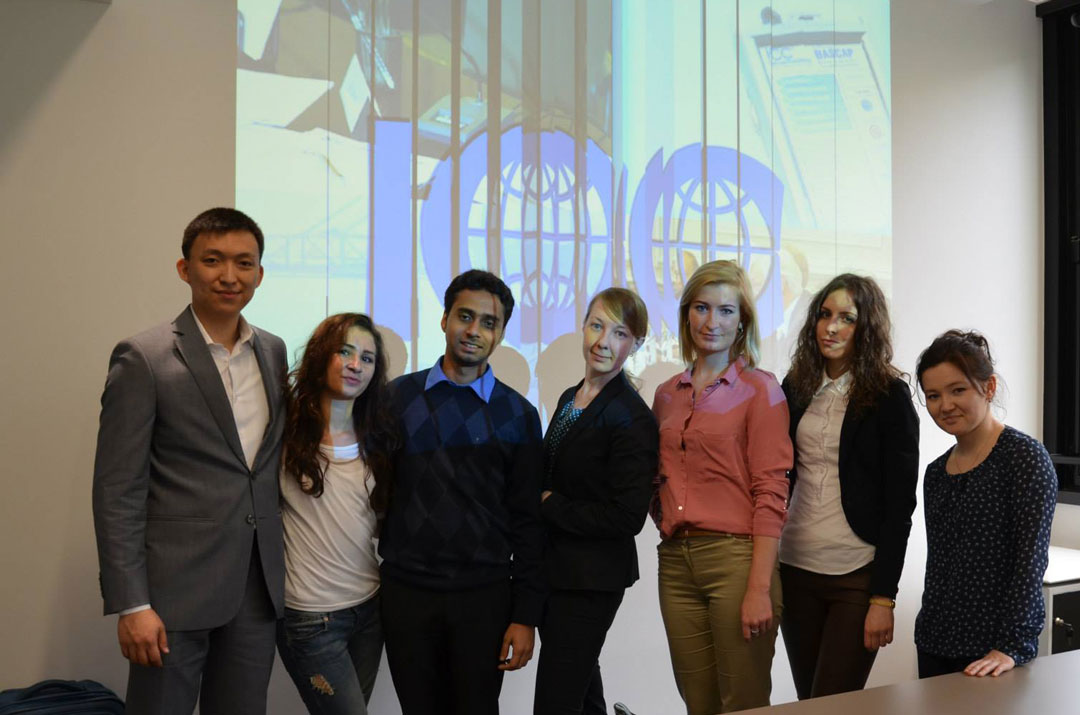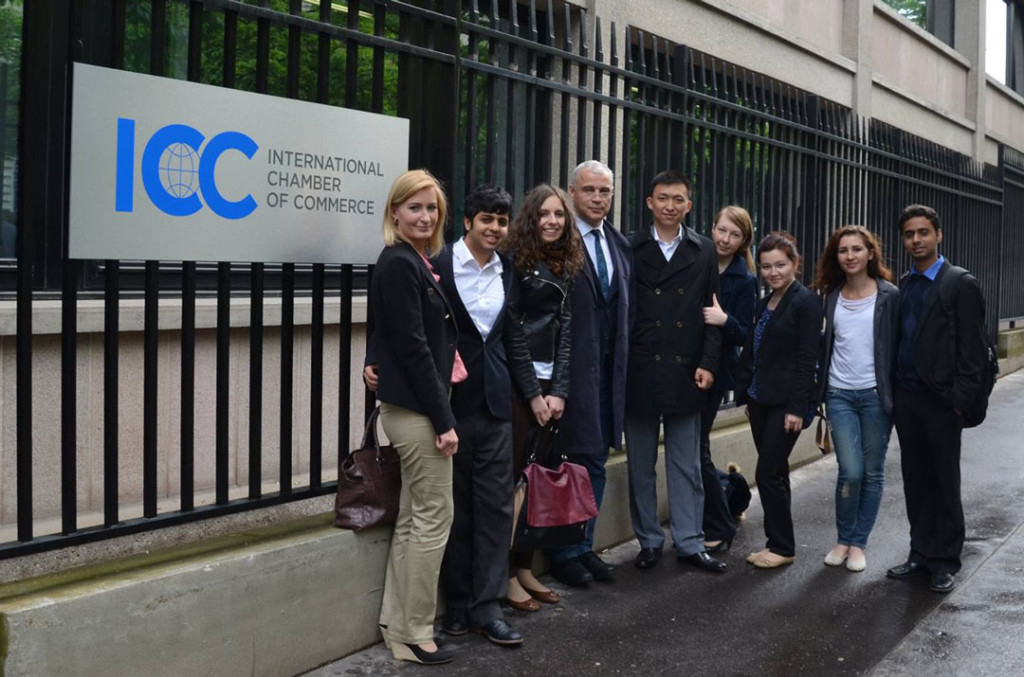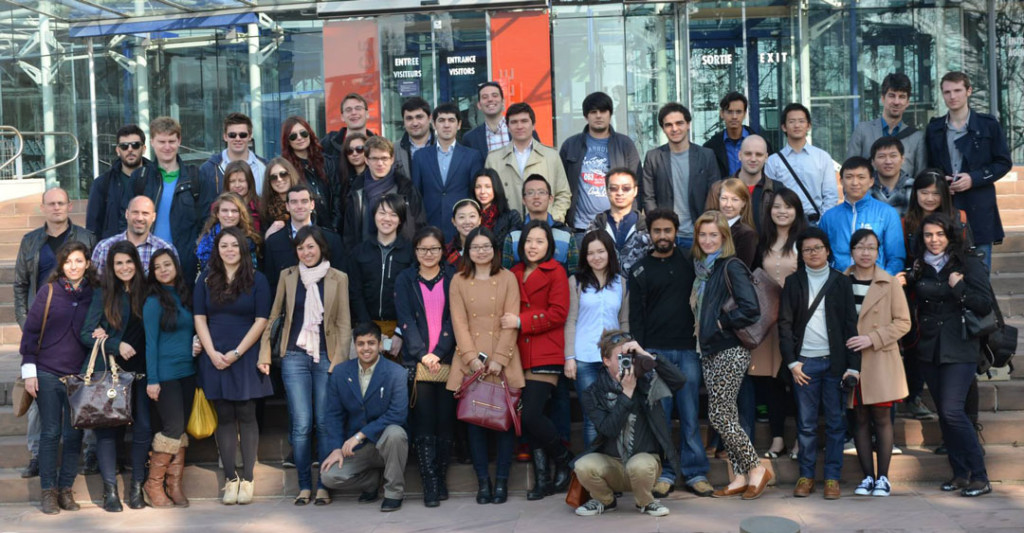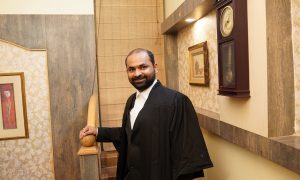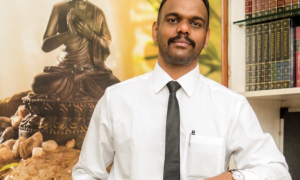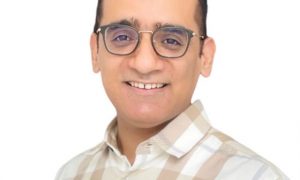 Kanad Bagchi graduated from KIIT, Bhubaneswar, in 2013. He has earned the Founders’ Gold Medal for this same reason. He won the Students’ Achiever Award also for raising the issue of the right to self-identification of third-gender with Mr. Navin Chawla, the Chief Election Commissioner at that time, along with a few of his colleagues at KIIT. He is also a DAAD Scholar and is currently studying LL.M. at Europa-Institut Universität Des Saarlandes.
Kanad Bagchi graduated from KIIT, Bhubaneswar, in 2013. He has earned the Founders’ Gold Medal for this same reason. He won the Students’ Achiever Award also for raising the issue of the right to self-identification of third-gender with Mr. Navin Chawla, the Chief Election Commissioner at that time, along with a few of his colleagues at KIIT. He is also a DAAD Scholar and is currently studying LL.M. at Europa-Institut Universität Des Saarlandes.
In this interview we speak to him about:
- Securing internships at top-notch law firms
- Studying at Europa-Institut Universität Des Saarlandes and recruitment opportunities there
- Details for application to the DAAD Scholarship
What was your motivation behind pursuing law?
I was a very estranged student during my school life and I couldn’t quite fit myself anywhere. I had a background in science but could never get myself to study it. Instead, I loved to read newspapers and write poems. I remember myself to be an avid debater in school. My teachers fondly used to tell me that I should be a lawyer. Little did I know then, that I would unknowingly get into something, I would grow to love so much.
So I could not make it to any of the entrance exams for engineering and I did not want to drop a year. KIIT Law School was the next best option (I could not make it through CLAT either) and I decided to give it a shot, thinking that I would appear again for the entrance exams next year. However, by the time it was next year, I was so engrossed into the law, that, this seemed like a conclusion rather than an experiment. At that time there was pressure from home that I re-appear for CLAT. Nonetheless, I was convinced that a new institution like KIIT law school would provide me an opportunity to grow along with it and to contribute in a much larger capacity. In retrospect, I believe it was one of the finest decisions that I ever made.
What kind of internships did you pursue as a student?
All kinds! I think it is important, at least for someone who is not absolutely certain as regards which field and area of law he/she would want to pursue, to do as many different kinds of internships as one possibly can. Five years is a long time for one to explore and I think this time should be made use of. So I tried my hands at litigation (Dr. Rajeev Dhavan & Rajshekhar Sir), corporate (AMSS), Shipping &Maritime law (George Rebello), Think Tanks (Observer Research Foundation & PILSARC), NGOs (HRLN & PUCL) etc. In the hindsight, all my internships were fascinating in different ways. Clearly, one month is not enough for you to know all about the area and the work, but you definitely get a feel of the environment. There is always something you can contribute to and take home with you.
Remarkable experiences have been many and more often than not, first time experiences. However, I think what has been truly remarkable for me is that; instead of mere one or two month’s periodic internships, I have built relations with my seniors and colleagues, which I continue to nurture. Some of them are very senior and established in their own fields and it is overwhelming to know that you have their unrelenting support and advice even after you leave.
How does one secure Tier I firm internships?
(Kanad has interned with formidable names such as Amarchand and Chambers of George Robello.)
I completely understand and identify with this concern. Back then KIIT Law School was in its formative years, and hence there was a lack of institutional backing from the University. We did not have a placement or an internship committee either, nor did we have the national law school tag. However, that certainly did not stop any of us. In fact, I would like to think that it made us more headstrong and determined. Although I would admit that we all had our own phases of despair and desperation, nonetheless, we were constantly on the lookout, for every little opportunity that we could get our hands on. Getting your first internship is always the most difficult one and it is advisable that you don’t aim only for the top tier I firms and put all your eggs in the same basket. Also, we began streamlining our internships according to our inclinations in law school. Post third year, we sent out applications with a lot more thought, purpose and planning. I started small and worked myself up the ladder. One thing that I learnt is that, once you are in and you perform well (not doing so was not an option for me), you will be recognized. People are more than willing to hire somebody who knows his stuff and is eager to work hard. So do not lose hope and do not be afraid to apply!
Rest everything remains the same. You apply early, follow up (read pester) with them, see to it that you explore all connections established from the previous internships. There is nothing like networking coupled with determined efforts, both during an application and the concerned internship.
Tell us something about the preparation that went into winning the Founder’s Gold Medal for outstanding all round and academic performance.
Frankly, I did not envisage it happening and neither did I consciously work towards it. Recognition is just a matter of time and will come, sooner or later, if you continue to work hard. It is not the starting point and neither is it an end in itself. At some level it is important to remember that you just do not work for yourself but also for people around you. Try and take them along with you. See if you can help your juniors, assist your teachers and participate in the institutional building of your university. In retrospect, I do not think I did anything extraordinary than to do things (sometimes over -did it) that a student is ideally supposed to do. Study! Study hard and study everything. Every lecture and every class discussion, howsoever insignificant it may seem to you, is important. I think the idea is to win the trust of your teachers and colleagues. For me law and legal studies has never really been a subject, but a living object. I live it every day and I look forward to it every day, to learn something new, to read a funny case law or share a little quip from a great biography.
You have also won Student’s Achiever Award for raising the issue of the right to self-identification of third-gender. How did you start working for such a novel cause?
The work on this issue began when I was in my first year trying to grapple with issues of constitutional law while working on a moot, along with my colleagues Alimpan Chatterjee and Prerna Dhoop. The central issue, I remember, was on the constitutional validity of Section 377 of the IPC. While delving deeper into the problem, we learnt that the ‘transgender’ were one such community who were severely affected by the above provision. That apart, our research indicated that there were various facets of life and society from which they were excluded. For instance, we learnt that they had to compulsorily register themselves as either ‘male’ or ‘female’ while availing voter-identity cards, passports etc, which was direct attack on the self-identity of their community, which considers itself as neither male or female. Therefore we raised the issue with the then Chief Election Commissioner, Mr. Navin Chawla, while he was on an official visit to our university. We later met him in his office in Delhi and he assured us that he will look into the matter. And well he did!! After a couple of months we got the news that the election commission, in a far reaching move has allowed the transgender and Eunuchs to register themselves as “others” in their voter id card. Whenever I recollect that evening, it fills me in with a sense of purpose and real achievement. However, this journey would not have been possible had it not been for the support of my colleagues and also our founding Director Prof. Faizan Mustafa, who stood by us all throughout. I think this incident also goes a long way to show that, some, if not all our civil servants are rather sensitive about issues around them and are determined to make a difference and improve lives.
It is heartening to see that finally good sense has prevailed on the government and they have extended a similar provision for passports as well (http://infochangeindia.org/human-rights/news/third-sex-finds-a-place-on-indian-passport-forms.html). Recently, as you all may know, the Supreme Court has also rendered a decision recognizing the transgender as “third gender” with consequential benefits.
What are the challenges you faced while working for the Right of Identification of the Third Gender?
One major problem, at least till a couple of years ago was the stigma that was attached with such issues. People around you are not very forthcoming when it comes to discussion or debate on this topic. Even amongst the educated lot, I have noticed a sense of disdain for the LGBT community. However, that is changing in a positive way. There is more and more research that is coming up on LGBT issues which is very encouraging to see.
What was your motivation behind doing an LL.M. abroad?
I have built a tremendous passion for the law over the years. I have practically dreamt of doing nothing else but the law. Path-breaking works of academia have always inspired and motivated me. For instance, during my studies on jurisprudence, I read with great interest the works of Newcomb Hohfeld, Matthew Kramer, Martha Nussbaum, Ronald Dworkin and the likes. I imagined an opportunity to work under them at some point, to write and research and teach, to build and to create. At some point, I started feeling a little distant from the way legal education is imparted in the country. I am certainly not saying that it is not good or not upto the mark (there are many honorable exceptions), but there is definitely a sense of vision which is lacking. Original research output in the legal field has remained almost stagnant. From my various interactions with professors and lecturers from different universities, I could gather a very grim impression of the world of academia, where you never graduate from being a teacher to a scholar. I see a very big difference between the two. A teacher is confined to imparting education in a classroom, whereas a scholar does not teach, he professes. His audience is much beyond the students in the classroom. He does not simply distribute information, but builds ideas. That’s why probably they say that good law schools teach you the law, but great law schools simply teach you to think. I could not find an environment back in law school, which could satisfy my hunger and passion for research and critical thinking. I wanted to experience a world where academics is a very serious affair and attracts the best minds in the profession. The above reasons essentially motivated me to apply for an LL.M. abroad.
Of course the immediate first instinct is to go for the big brands that exist out there. But to my mind, that is not a very appropriate approach. I looked at the program, the length, the number of years it has been in existence and the reputation of the same. I looked into the faculty profile, profile of current students and the alumni. I shot out emails to the administration and the faculty members asking for their opinion. I also looked at the industry support and connections that the university has built, the conferences they organize and the kind of contribution they have made to legal academia.
How did an LL.M. at Europa-Institut Universität Des Saarlandes happen?
Contrary to convention, for me, the University happened because of the Scholarship (DAAD). The DAAD scholarship allows you to choose amongst three universities. The Europa-Institut, Saarland University, the Europa-Kolleg Hamburg and Freie Universität Berlin. Since I was more inclined towards the study of EU law, Europa-Institut was an easy choice. However, the dilemma then was that I had been offered admission in two other Universities. I was offered a full fellowship at the Central European University, Budapest for an LL.M. in Comparative Constitutional Law. I was also offered a place at NYU. I declined the offer at CEU because I was more inclined towards accepting a named scholarship like the DAAD rather than a departmental fellowship from a University. Also by then, I had numerous interactions with previous DAAD scholars, which only added more firmness to my thought. I had to reluctantly let go of NYU as it would have been a huge financial burden on my shoulders. No scholarships were on offer there.
Tell us about the application procedure for the DAAD Scholarship.
The idea of pursuing an LL.M. grew to be more concrete since my fourth year at law school. I was actively on the lookout for scholarships as I was not very keen on funding it all by myself. The start was rather staggering, because I did not have the slightest clue as to where to begin. It’s a process and I must say it can get rather exhausting. I did not have seniors who had been through the process before, other than Mr. Alipak Banerjee, from whose experience I benefited greatly. Nonetheless, I was fortunate to have colleagues like Mr. Jitendra Soni (Jeet) and Rudrani Banerjee (Rudrani) who were constantly with me throughout the process, from its initiation till its end.
The DAAD scholarship application is a two-step application process. First stage is the submission of documents consisting of your grade transcripts, CV, statement of motivation (SOM) and recommendation letters. The most important is of course the SOM. It can take days together to write a good SOM. It helps if you have a clear idea as to what you wish to study, where and why. I remember having numerous discussions with both Jeet and Rudrani regarding the questions that I should address in the SOM and their possible responses, which added much clarity to my thought. Further, it is very important to be precise and clear in your drafting. There should be a logical link flowing through every line that you write. Every comma and every full stop matters! I had the benefit of running several drafts through both of them before I finally sent it out. The second stage is the interview rounds. You are grilled by a panel of three or four judges, comprising of both German and Indian professors and members from the DAAD. They would mostly be interested in your research proposal and how you plan to go about with it. Also, make sure that you know your CV in and out. Different things work for different people. What worked for me was that the German judges were quite impressed with my knowledge of the German legal system and especially German constitutional law, which I had studied in detail under Prof. Kartikeya in this course on Comparative Constitutional law.
What I had initially imagined of the scholarship was completely different from how it turned out to be in reality, in a very positive way. From the website, one only gets to know the details regarding the waiver of tuition fee or stipend and the like. It is only when I arrived here that I could really appreciate the prestige and stature of the scholarship. For LL.M. students it is not so much the DAAD scholarship but it’s the Dr. Angela Merkel Scholarship which makes all the difference. I had the blessed opportunity to have received an invitation from the Chancery building to meet with the foreign security advisor of Ms. Merkel. I have also interacted with a number of MPs from the Bundestag (German Parliament). Moreover, DAAD organizes an annual scholar’s meet where other DAAD scholars pursuing different streams are brought together under one roof for various events. It is fascinating to meet so many different scholars from different fields across different continents and to talk to them (not to mention all the arrangements are made by DAAD). Further, I would like to mention that the DAAD team responsible for India is simply superb. They take care of everything, from your visas to your safe arrival, accommodation and German language training for the first two months, help you out with settling down, getting your residence permit, practically everything and anything that you may need. DAAD is a very well know organization in Germany and is extremely resourceful. So even in an alien land, you are in safe hands. Lastly, the stipend that they pay out is quite generous.
What is the recruitment for overseas students like?
I would say that the recruitment prospects for overseas students is challenging. The biggest barrier for an overseas student in Europe is language. Recruiters, invariably look for English along with a high degree of proficiency in German, Spanish, Italian or French. However, the good thing is that the DAAD scholarship offers you two months introductory course in German language which you can further work upon throughout the year in your respective university. If you really take the language issue seriously and work towards it, you have a good chance.
Having said that, I have different plans and I am not looking for a job in Germany at the moment.
How was your experience at Europa-Institut?
Simply Splendid! Europa-Institut has its own special place in the context of European Integration. It attracts scholars from all across Europe and is considered to be a center of excellence in EU law. As a matter of fact this year it received the prestigious Jean Monnet Chair for European Law and is now being headed by our current director Prof. Thomas Giegerich. We have faculty members drawn from all over the world and that provides a stimulating environment inside the class. We have a very nice mix of both practitioners and academicians, which really completes your learning. Some of our Faculty members like Prof. Martin Selmayroccupy very high positions in the European Commission and it is interesting to study the practicalities of policy making in Europe from an expert hand. I must also state that most of our faculty members are very passionate about their subjects and some of it actually gets rubbed onto you. I am here, in an alien jurisdiction, studying European law and I have never been more fascinated. The advantage of having lecturers from such institutions is that you can objectively seek to know things that you will never find in your books. The administration at the Institut is very friendly, helpful and remarkably organized. Europa-Institut makes it a point to augment your classroom readings with real life exposure. Drawing from its vast pool of faculty connections, it regularly organizes conferences and workshops at different forums like the European Court of Justice, the European Court of Human rights, the European Commission, the European central Bank, the WTO and the likes. For instance, just last week, I was in Paris presenting a paper on Arbitration at the International Chambers of Commerce. I also made an embarrassing attempt at skiing for the first time in my life, while I was in Italy for a conference organized by the Europa-Institut. Further, I was selected to represent the University at Eurosim, 2014 held in Netherlands. It was a wonderful experience to simulate the work and practice of European Institutions.
I simply love the library here. It is big enough for someone to literally get lost in it. It contains a huge variety of collections and is not just limited to the law. I was presently surprised to see an extensive collection of Indian Constitutional law in one of the sections. The Master’s and PhD thesis section containing research papers by different scholars for over four decades really allows you to see the evolution of EU and International law from the perspective of students and researchers. Further, we have subscriptions to practically all online databases that one can think of and you can access them personally even from your home by using your login id and password.
The highlight, however, I would say is the diversity of my batch. I have colleagues from thirty eight different countries and all continents being represented. It really brings in an array of divergent opinion and thoughts while mentioning matters inside or outside the classroom. You have students from law, political science, international relations, economics, social sciences and engineering. Everybody brings in something unique onto the table and you can go back home, more aware and more educated. Even amidst this diversity, I have felt togetherness. On a lighter note, I had never imagined that I would be able to enjoy an India-Pakistan cricket match on TV with a Pakistani student from Karachi, Ambreenor for that matter an Israeli and Palestine student sharing rooms together. Such experiences make you realize that problems among nations are always at a different level and are never really personal.
In essence, I wish I could do this one year all over again.
How was the academic schedule?
Quite hectic! Most of the days we have classes from 9 AM to 5 PM. Then you most certainly have to go the library to prepare for the next day’s lecture. You are invariably flooded with assignments, presentations, seminar papers, case studies and exams. So yes, there is lot of work to be done on a daily basis. I think it’s good, because it keeps you on your toes all day long.
What were the subjects you chose?
I am doing an LL.M. in European and International Law with a heavy concentration on European Institutional law, EU competition, banking and monetary law. I had always been fascinated by how Europe has keep twenty eight nations together under the same roof, in pursuit of similar aims and in the face of conflicting interests. The European Integration project as it stands today is not just a legal, political and economic union, but a union of destinies. So therefore it was interesting for me to study this mammoth creation, while living in the heart of Europe. I studied monetary law, primarily because of my inclination towards economics. I was excited to delve deeper into the issues relating to the Sovereign debt crisis in Europe. To my mind, there was no better prospect of studying about the EU Debt crisis, at a time, when it was in its full swing, happening in a region where you are living and taking lectures from people who have literally been at the centre of things during the crisis. It was a strategic decision to study EU competition law because as you might already know, competition practice in India has been greatly influenced by the rules and regulations in EU and USA.
How’s the Indian fraternity over there?
Yes, Germany hosts a large number of Indians, spread out quite evenly throughout the country. I have two Indians in my LL.M. program and lot many more in the University. The Indian community at the University regularly organizes dinners and cultural nights. Therefore, I don’t as much miss my daal bhaat. They also organize trips to various places in and around Europe.
What are your future plans?
Although, having spent almost a year here at the Europa-Institut, studying a whole range of subjects, I still find myself, in an indecisive position. One thing that I can safely say is that, the appetite in me to study further has only grown. I am ever more fascinated towards European Studies and I remain excited to explore further and dig deeper. Notwithstanding the fact that I am still relatively untrained to the idea of European Integration, the lectures here at the Institute, was a throwback to similar structures, issues and solutions. I could see myself applying the concepts and mechanism that I had learnt back in law school. Also, my training in the common law traditions has been huge advantage. For now, I am working towards the completion of my course and hopefully by then, I will be a little more certain about my future goals.
What would be your advice to law student interested in going for higher studies from India?
First and foremost, be sure of the fact that you want to pursue an LL.M. after your graduation. An LL.M. is a huge investment in terms of time, effort and also money (if not on scholarship). Ask yourself the question as to why do an LL.M.? What is it that you are trying to achieve out of this? How would it benefit your case? You career and your personality? The first step in an LL.M. application is to convince yourself that you would want to pursue it. Talk to your seniors, your teachers, your colleagues. Think hard, think deep and introspect. Once you have crossed that stage, it is important for you to think about which area of law would you like to specialize in and why? Deeply analyze your key areas of interest and to shortlist courses/universities on the basis of the same. Every college would require you to demonstrate an unwavering commitment to the field you are interested to pursue. Moreover, you have to be clear whether you want to practice law or enter academics. Choice should also be influenced by the country you want to study, or (if possible) work in and the value of that country’s LL.M. programme in India, in case you intend to return.
Once you have a definitive course and list of universities you are applying, then you need to focus on two things simultaneously, the procedural part (deadlines, required documentation, payment of application fee, etc.) and substantial part (SOP and Reference Letters). Statement of Purpose (popularly known as SOP, SOM, etc.) is the most essential document of all, which would determine the strength of your application. It is a very popular and lucrative approach to make your statement of purpose a replica of your resume. However, it is advisable that you refrain yourself from doing that. Rather than focusing on ‘what’ you have ‘done’, spend some thought on penning down ‘how much’ and ‘what’ have you ‘learned’. Try and build a link between your past, present and future.
What’s your take on work- life balance? How do you go about it?
I am not the best person to answer that question. I think a big chunk of my life is my work and voluntarily so.

